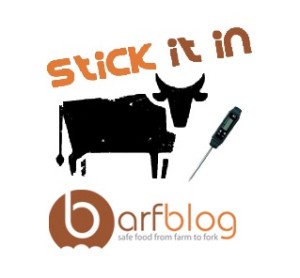The UK Food Standards Agency has made a begrudgingly acknowledgement to thermometers, but still insists on color to tell if burgers are done.
 The growing popularity of burgers served pink has led the FSA to develop the advice on rare burgers. It is aimed at helping businesses meet consumer demand for rare burgers while keeping customers protected. Burgers that aren’t thoroughly cooked can contain bacteria that cause food poisoning if the right controls aren’t in place.
The growing popularity of burgers served pink has led the FSA to develop the advice on rare burgers. It is aimed at helping businesses meet consumer demand for rare burgers while keeping customers protected. Burgers that aren’t thoroughly cooked can contain bacteria that cause food poisoning if the right controls aren’t in place.
In September 2015, the FSA Board agreed a number of controls that food businesses serving burgers pink will need to have in place to demonstrate that they are maintaining customer safety. The new advice sets the options out and they include:
- sourcing the meat only from establishments which have specific controls in place to minimise the risk of contamination of meat intended to be eaten raw or lightly cooked;
- ensuring that the supplier carries out appropriate testing of raw meat to check that their procedures for minimising contamination are working;
- sStrict temperature control to prevent growth of any bugs and appropriate preparation and cooking procedures;
- notifying their local authority that burgers that aren’t thoroughly cooked are being served by the business; and,
- providing advice to consumers, for example on menus, regarding the additional risk.
 The draft advice is for caterers and local authorities only and the FSA’s long-standing advice to consumers is unchanged: burgers prepared at home should be cooked thoroughly until they are steaming hot throughout, the juices run clear and there is no pink meat left inside. If using a temperature probe or cooking thermometer, make sure the middle of the burgers reaches a temperature of 70⁰C for 2 minutes.
The draft advice is for caterers and local authorities only and the FSA’s long-standing advice to consumers is unchanged: burgers prepared at home should be cooked thoroughly until they are steaming hot throughout, the juices run clear and there is no pink meat left inside. If using a temperature probe or cooking thermometer, make sure the middle of the burgers reaches a temperature of 70⁰C for 2 minutes.

